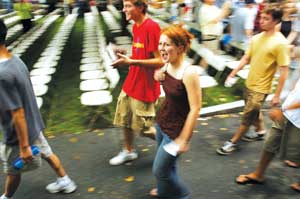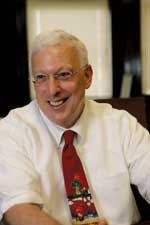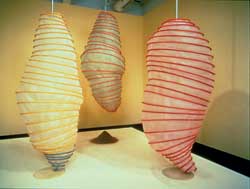 |
| | |
 |
|
 |
 |
 |
UPFRONT
|
 |
| Brian Loeb, A06 |
Enter: Class of '09
It’s not difficult to know when college starts on the Medford-Somerville campus. Blue and white balloons spring up at every vantage point to greet the new arrivals. Up go Dining Service tents for a free picnic on the Hill. And it’s likely you’ll hear the bright strains of Tuftonia’s Day drift across the Quad as students rehearse for Matriculation ceremonies. This year was certainly no exception. On August 31, the campus was a beehive of activity as 1,367 members of the Class of 2009 descended with predictable chaos and excitement. T
he freshmen, divided almost evenly between women and men, come from more than 44 states and 45 nations; they have grown up among the urban neighborhoods of South Central Los Angeles and the quiet corn fields of Iowa. More than 44 languages are spoken in their homes. Twenty-eight percent are people of color, including a record 184 Asian-Americans. President Lawrence S. Bacow greeted the new arrivals with words of wisdom during his Matriculation address, including a call to carry on a Tufts legacy. “We believe that with education comes responsibility—responsibility to make the world a better place,” he said. “At Tufts, we embrace active citizenship as one of our core values. We expect each of you to get involved, to work for the benefit of others—not just here and not just now, but throughout your lives.”
|
| |
| Back
to Top |
 |
 |
 |
Disaster Response
The devastation of Hurricane Katrina rallied the Tufts community in September when students, faculty, and staff responded to the enormous humanitarian crisis. Tufts welcomed nearly 50 Tulane University students whose education has been disrupted. Most them are attending classes this fall in the School of Arts and Sciences and School of Engineering. Others include two students at the School of Medicine; two at the Sackler School of Graduate Biomedical Sciences; one at the Friedman School of Nutrition Science and Policy and two at the Graduate School of Arts and Sciences. Students across the university responded with characteristic resourcefulness, organizing fundraisers such as a Fat Tuesday benefit concert, sponsored by the Leonard Carmichael Society, and a Mardi Gras beads fundraiser, sponsored by Theta Chi and by the Tufts Hurricane Relief Effort (HRE), created by Lindsey Overstreet, A06. “It was really great to see how much the Tufts community cared about the victims of Katrina,” said Overstreet, who added that HRE supporters also sold paper magnolias at the benefit concert, made by her housemate, Kristen Casazza, A06. “I simply put out an email out on tuftslife.com and was overwhelmed by the show of concern.” |
| |
| Back
to Top |
 |
 |
 |
| Veterinary School To Build Regional Biosafety Lab
The Cummings School of Veterinary Medicine has received a $15 million grant from the National Institutes of Health to build a state-of-the-art regional biosafety laboratory that will advance research into food- and water-borne diseases that threaten public health.
The new laboratory, scheduled to open in 2008, will serve as a resource for the growing life sciences cluster in central Massachusetts, home to the second-largest number of biotechnology, medical device, and pharmaceutical companies in the Commonwealth. The NIH grant will provide 75 percent of the funding to build the 30,000-square-foot research building in the Grafton Science Park on the western portion of the Grafton campus. Tufts will contribute $5 million toward the cost of the building.
“This research building will provide the safest possible environment for our scientists to continue their work to improve human and animal health,” said Sawkat Anwer, interim dean of the Cummings School. “Tufts’ Division of Infectious Diseases will use the new laboratory to safely continue its internationally esteemed research into preventing, detecting, and treating food- and water-borne diseases that are frequently transmitted by animals. Our researchers have been studying these diseases since 1990.”
More than 75 percent of all infectious diseases that have emerged in the past 50 years have come from animals.
|
| |
| Back
to Top |
 |
 |
 |
| Gates Grant Funds Vaccine Research
The Bill and Melinda Gates Foundation this summer awarded $5 million to microbiologist Abraham “Linc” Sonenshein and his team to support research into a new generation of vaccines that could be administered through the spores of the soil bacterium B. subtilis.
Sonenshein, professor of molecular biology and microbiology, has worked with the harmless bacterium for four decades. His colleagues will attempt to genetically engineer the organism to express the antigens for specific pathogens on the surface of the bacterium. Antigens are the proteins that stimulate the immune system to develop resistance to specific diseases.
The work could make inexpensive, needle-free, heat-resistant medications widely available in developing nations where poverty, the lack of trained personnel to give injections, and inconsistent refrigeration means some 27 million children annually are not protected against common childhood diseases.
“The dream scenario is that we can distribute these freeze-dried spores in a packet,” said Sonenshein. “They have an infinite shelf life, and they can be taken orally mixed with juice or water.”
Sonenshein is the principal investigator for the research team that includes Dr. Saul Tzipori, professor of biomedical sciences and director of infectious diseases at the Cummings School of Veterinary Medicine at Tufts, and Dr. Miguel Stadecker, professor of pathology. The team will collaborate with Gerald Keusch, associate dean for global health at Boston University’s School of Public Health.
They will focus on developing two vaccines—one to combat diphtheria, pertussis, and tetanus, and one to prevent rotaviral diarrhea, a disease that kills 500,000 children in developing nations each year.
With work going on simultaneously on both the Boston and Grafton campuses, the first clinical trial in humans could be under way in five years, Sonenshein predicts.
“It’s a wonderful example of how a team within Tufts––the people downtown came to us––combined their expertise to make the application a success,” said Tzipori.
The grant funding the Tufts group is one of 43 the Gates Foundation awarded in June as part of its Grand Challenges in Global Health initiative.
In addition to the Sonenshein grant, Andrew Camilli, associate professor of molecular biology and microbiology at the School of Medicine and a Howard Hughes Medical Institute investigator, is a co-investigator on a $14.8 million Gates-funded project with Roy Curtiss of Arizona State University to develop a single-dose oral vaccine for bacterial pneumonia for newborns. The current vaccine requires a complicated regimen of four injections given at specific intervals.
|
| |
| Back
to Top |
 |
 |
 |
A Civil War Tribute
A national traveling exhibition that reexamines President Lincoln’s efforts toward the abolition of slavery is on display at Tisch Library through December 2. “Forever Free: Abraham Lincoln’s Journey to Emancipation,” consists of panels showcasing reproductions of rare historical documents, period photographs, and illustrative material. Tisch Library, the only library in Massachusetts selected to host the exhibition, celebrated the grand opening on October 14 with remarks by Pulitzer Prize–winning historian David Herbert Donald. Parents Weekend took advantage of the exhibition’s opening as well, incorporating events such as a Friends of Tufts Libraries talk by Catherine Clinton, author of Harriet Tubman: The Road to Freedom, and a “memory walk” that looked at Civil War markers on the university grounds. The exhibition is organized by the Huntington Library and the Gilder Lehrman Institute of American History in cooperation with the ALA Public Programs Office and funded by a grant from the National Endowment for the Humanities. |
| |
| Back
to Top |
 |
 |
 |
 |
| Melody Ko |
New Dean Joins Arts and Sciences
Tufts welcomed a new dean of Tufts’ School of Arts and Sciences on August 15. Bob Sternberg comes from Yale, where he spent 30 years as a professor, most recently as the IBM Professor of Psychology and Education and professor of management in the School of Management, and director of the Center for the Psychology of Abilities, Competencies, and Expertise ( PACE Center), which he founded and now brings with him to Tufts.
“One of the things I hope to do is work with faculty and others who are interested in improving teaching and assessment to reach all of the diverse styles of thinking and learning that students bring to the classroom,” he said.
Sternberg said he was excited to join Tufts leadership. “I greatly admire what President Bacow and Provost Bharucha are doing,” he said. “The truth is that most academic leadership is transactional. There’s a give and take between leaders and followers, but the institution doesn’t change much. There are very few presidents and provosts now who are transformational leaders and who are genuinely transforming their university in a positive way. I thought it would be exciting to be part of this leadership team.”
He succeeds Susan Ernst, who has returned to teaching and research in the biology department. Most of Sternberg’s academic work focuses on the notion that there are different kinds of intelligence and that intelligence testing and standardized tests can do some students a disservice. After performing poorly on an IQ test as a child, Sternberg said, “My teachers thought I was stupid, so I thought I was stupid. Everyone was happy because I was supposed to be mediocre, and I was.”
But his fourth-grade teacher believed there was more to a person than test scores and he began to believe in himself. “So I went from being a so-so student to being a really good student,” he said. “I learned early about self-fulfilling prophecies, and the harm they can cause. A key theme of my work is that conventional tests only give you a very limited vista of what a person can do, and so we should be careful in drawing conclusions from them.”
After obtaining his undergraduate degree in psychology summa cum laude from Yale in 1972, he went on to earn a Ph.D. from Stanford University in 1975. He dedicated his book Successful Intelligence: How Practical and Creative Intelligence Determines Success in Life (Plume, 1997) to his fourth-grade teacher.
In addition to getting to know Tufts, Sternberg expects to continue his regimen of walking for about 45 minutes each morning. Will he go running with Bacow, who leads the Tufts community in annual training for the Boston Marathon? Well, no, “but I might time him,” he said, flashing a big smile.
|
| |
| Back
to Top |
 |
 |
 |
| Tufts Appoints Chief Information Officer
Amelia “Mely” Tynan has been named vice president for Information Technology and chief information officer. She comes to Tufts after six years serving as the University of Rochester’s vice provost and first CIO.
At the University of Rochester, she worked closely with faculty to use technology to support their teaching and research. She developed the school’s first strategic technology plan, working with a campus-wide IT Council. She rationalized the technology structure of the university, combining five units reporting to five vice presidents into a single structure. Wireless computing, advanced networking, new courseware, and online registration and admissions were just some of the enhancements that she introduced.
Under her leadership, the University of Rochester became a founding member of the Northeast Lambda Rail, an advanced optical network for cutting-edge research projects.
“Digital technologies, new media, and other communication tools offer limitless possibilities to enhance academic life,” said President Lawrence S. Bacow. “Mely Tynan has excelled at bringing academics and technology together to build a stronger educational community. We’re absolutely delighted that she has chosen to come to Tufts.”
“I am thrilled about the quality of Tufts initiatives and the opportunities ahead. I have found technology to be most compelling when it connects people and ideas, and creates new community and learning contexts,” said Tynan. “I am looking forward to working with Tufts deans, faculty, and others in the university community to take full advantage of these exciting possibilities.”
She holds a B.A. in psychology magna cum laude from Saint Paul College, Philippines, and a master’s in psychology from the University of the Philippines. |
| |
| Back
to Top |  |
 |
 |
|
 |
| Image courtesy of the artist |
At the Galleries
A sensory experience that references the patient and daily work of the silkworm debuted in the Koppelman Gallery in September with the opening of Mei-ling Hom’s Silkworm Grind. The work, created in collaboration with the Fabric Workshop and Museum in Philadelphia, consists of three large-scale aluminum silkworms sheathed in silk; each form also emits a pungent aroma (a blend of five spices) as the forms slowly gyrate. Through November 13.
Next door, in the Remis Sculpture Court, Wenda Gu fuses traditional Chinese ink painting, seals, and furniture in his United Nations series of monuments, which he has installed in 15 countries. At Tufts, Gu’s two 22-foot-high sculptures are totems made from the human hair of various races, formed into blocks and supporting the pseudo-calligraphic characters of an invented language. These nonsensical “un-words” (the oral expression of Mandarin Chinese words into English that are then transliterated back into Chinese) aim to expose how attempts at translating languages and cultures can be rife with misunderstanding. Through January 8, 2006.
|
| |
| Back
to Top |  |
 |
 |
| A Towering Success
When the Tower, the café at Tisch Library on the Medford–Somerville campus, opened last October, James Glaser, dean of Undergraduate Education, was more than a little eager to see it succeed. The café grew out of recommendations from the president’s Task Force on the Undergraduate Experience on which Glaser served. It was created to help address a need for more places for students to come together informally with friends and faculty.
Tufts thought placing the café in a central location—in the Dranetz Tower on the first floor of the library—would be a good place to start. They hoped to set a casual but upscale tone with the décor and the menu, edibles ranging from sandwiches and yogurt to a variety of teas and coffees. Glaser said he’s “thrilled” by the first assessment of the new café. “The numbers are stunning” he said. There were almost 84,000 transactions in the café over the school year and traffic into Tisch Library increased by almost 40,000.” In particular, he’s pleased to report that students are taking advantage of the incentive for more faculty-student interaction; the dean’s SPIRIT Fund picks up the cost of every beverage consumed by students and faculty who meet together in the café. As an added bonus, Glaser also said the corridor to the café has been transformed by artwork, including four exhibits of student artists in the Tower Gallery. The faculty publication display also had a continual turnover of books and articles. “Faculty are very happy that there is now a prominent display place on campus to recognize scholarship,” he added. “So this really has become a place to celebrate student and faculty accomplishments.” |
| |
| Back
to Top |
 |
|
 |
 |
 |
|
|
 |

